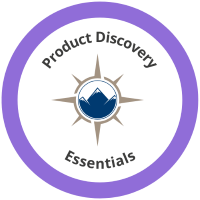Inside category „Products and Services Design” we present practices of both initiating and transforming vision of a new product or service into a defined business model, further verified by a functional prototype. As a components of these practices appear methods used by both startups, as well as the R&D or innovation departments in large corporations.
Moreover, topics like defining unique value proposition of a new product or service, customer segments, communication channels, partners, as well as metrics to monitor, progress will be defined. As a result, it will be possible to verify is there a real market need and whether the offered solution will be so revolutionary, that specified customer segment will invest in it.
Look below for specific courses and if necessary you can always ask us for an advice what to choose!
Business Model Generation
What is the Business Model Generation training?
Regardless of whether you work in a corporation or a startup, a repeatable business model is essential to deliver business value and maintain service profitability. However, this model should change, adapting the strategy to market reality, maintaining competitiveness in times of constant innovation.
The proper use of the Business Model Generation method allows to increase the innovativeness of the designed products/services and build the competences of the intrapreneur. This person (or a group of people) is able to define the unique value of a new product/service, target groups, channels, partners, as well as metrics that allow monitoring the profitability of activities.
Thanks to the above, it will be possible to verify whether there is a real market need and whether the offered solution will be revolutionary and profitable enough that a given market segment will want to invest in them.
Get to know the compilation of knowledge and practice lightweight tools and processes to effectively design, validate and develop business models. The concept comes from the idea of Business Model Generation by Alexander Osterwalder and Yves Pigneur, Running Lean by Asha Maurya, as well as the practical experience of our experts resulting from the role of Product Manager, business model consultant and broadly defined entrepreneurship.
Who’s behind this?
Alexander Osterwalder, a business modeling consultant and Yves Pigneur, a professor of information systems management published the book Business Model Generation in 2010, based on the experiences of 470 practitioners of creating business models from 45 countries. This book revolutionized the approach to designing business models. Based on their work, serial entrepreneur Ash Maurya developed the Lean Canvas concept, adapting the method to the reality of startups - extreme uncertainty.
Playing Lean Startup
What is the Playing Lean Startup training?
Playing Lean Startup is an authorial training program with an accredited simulation game Playing Lean that teaches how to steer a startup development, regardless of whether it is started in a garage, in a medium-sized company, or as an isolated unit within a corporation. It shows when to pivot and when to persevere in order to grow the business with maximum acceleration.
The proper use of the Lean Startup concept through the feedback loop from potential customers allows you to quickly validate the prototype of the solution and shorten the time between the team's work and the first satisfied customers.
The foundation of the process is the Build-Measure-Learn loop, which, supplemented with the concept of Validated Learning, Innovation Accounting and the assumption that entrepreneurship is management, allows to introduce innovations in a more predictable way.
You don’t need dry theory and science. Do you want to learn about the Lean Startup concept through practical knowledge, lightweight tools, exchange of experiences and an educational game? We have something for you!
Who’s behind this?
Serial entrepreneur Eric Ries is credited with pioneering the Lean Startup method described in the best-selling book “The Lean Startup: How Today’s Entrepreneurs Use Continuous Innovation to Create Radically Successful Businesses” published in 2011. The approach itself is based on the work of figures such as Steve Blank, Clayton M. Christensen, or Geoffrey A. Moore.
In 2015, four Lean Startup enthusiasts led by Simen Fure Jørgensen, through a series of experiments and crowdfunding introduced the first version of the Playing Lean educational board game. Since then, the game has become a hit and subsequent rounds of funding have introduced new versions of it.

Product Discovery Essentials
What is the Product Discovery Essentials training?
Perhaps you are a Product Owner, maybe a Product Manager, or you are just beginning to explore the field of product discovery and seek inspiration to improve this challenging process? The process of continuous product discovery. Or simply you want to implement best practices and standards in your organization, as well as develop your own way of working for your organization?
Product Discovery Essentials is an authorial training program designed for people who want to better understand their customers’ needs, validate hypotheses and effectively manage product lifecycle. This training will be valuable both in the early stages of a product, during product growth exploration and when things become too overwhelming with uncertainty.
During the workshop, participants will have the opportunity to work on real-life case studies that will help them apply the knowledge they have gained in practice. The training combines theoretical fundamentals with intensive practical exercises, enabling participants to understand and master key aspects of Product Discovery.
Who’s behind this?
The very concept of Product Discovery was widely popularized by Marty Cagan in his famous book “Inspired: How To Create Products Customers Love”, first published as early as 2008 and revamped in 2017 with a second edition of the book.
Building on this, Teresa Torres, published her book “Continuous Discovery Habits” in 2021, which expanded it to include modern practices and further popularized it, from now as a concept of continuous product discovery. Their work has become the foundation for many modern approaches used every day by Product Managers around the world.



